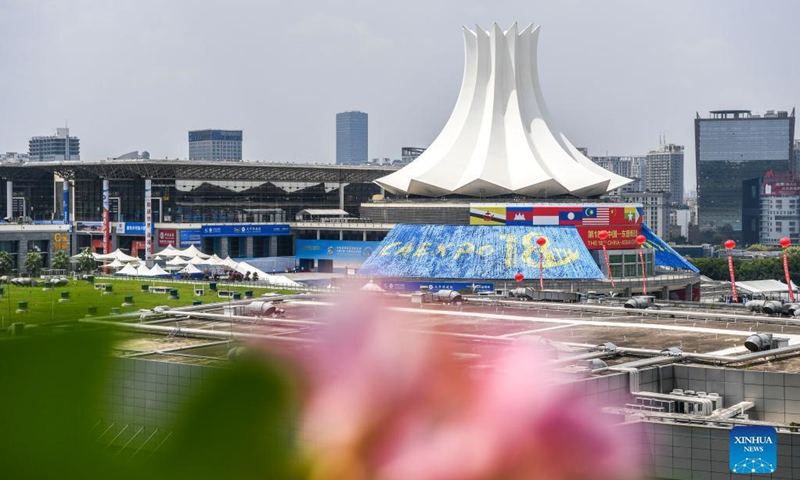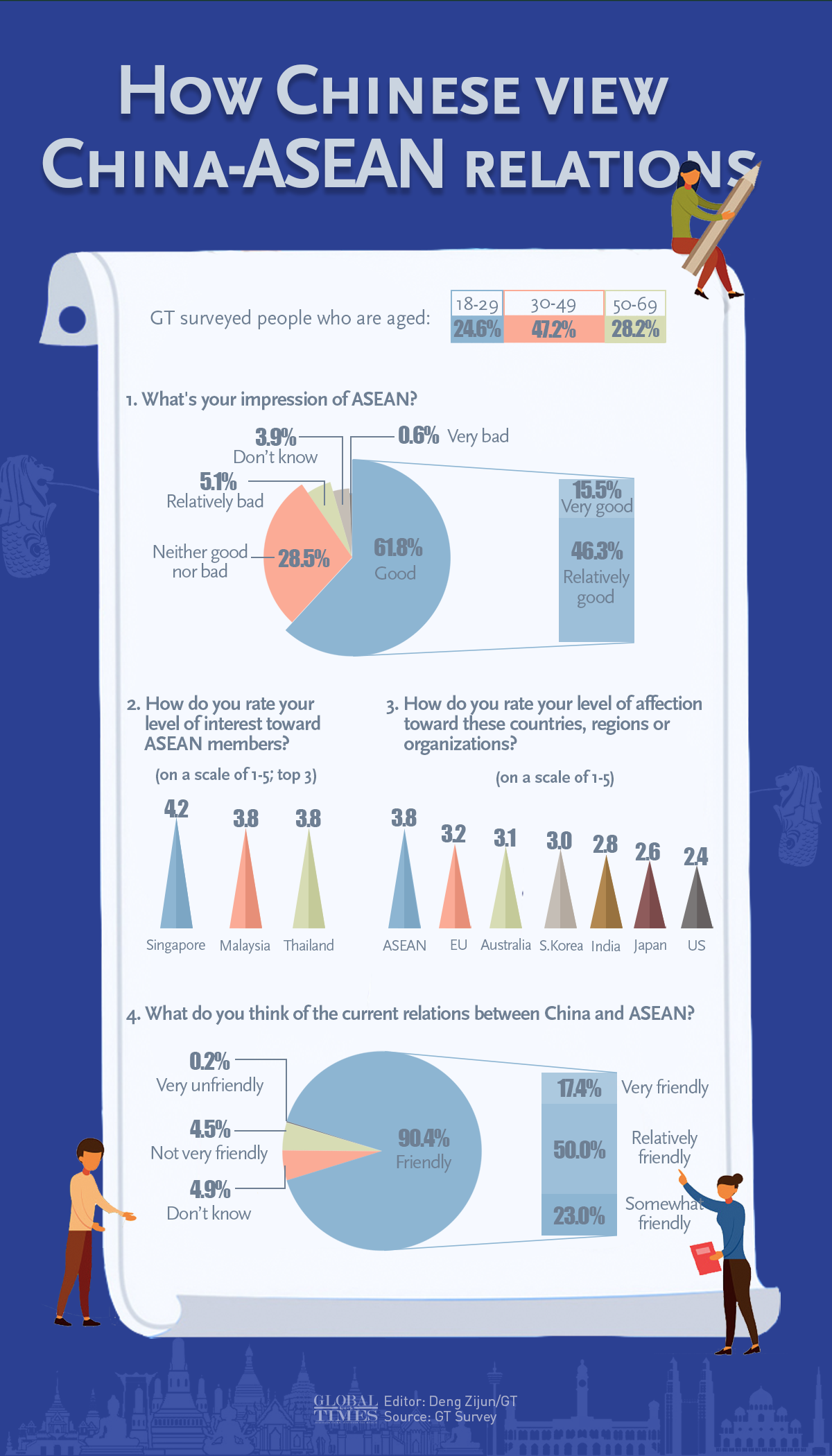Nine out of 10 Chinese see friendly China-ASEAN ties
Nearly 80% consider US as ‘biggest disruptor’: GT survey

Photo taken on Sept. 10, 2021 shows a view of the Nanning International Convention and Exhibition Center, the venue of the 18th China-ASEAN Expo and China-ASEAN Business and Investment Summit, in Nanning, capital of south China's Guangxi Zhuang Autonomous Region. The 18th China-ASEAN Expo and China-ASEAN Business and Investment Summit kicked off on Sep 10, in Nanning, highlighting the building of a closer China-ASEAN community with a shared future. Photo: Xinhua
While China-related topic is expected to dominate the upcoming US-ASEAN summit, a recent survey showed that nearly 80 percent of Chinese respondents said the US is the biggest disruptor of the sound relations between China and ASEAN members but about 90 percent considered the China-ASEAN ties as friendly and over 75 percent hold a positive attitude toward their future.
The survey was jointly conducted by the Global Times Research Center and Centre for Chinese Foreign Strategy Studies, Renmin University of China between March 15 and April 15 in 31 Chinese provinces, regions and municipalities among the general public aged 18 to 69 and college students. It collected 2,012 valid questionnaires from the general public and 1,150 from college students.
About 61.8 percent of the respondents said they have a good impression of ASEAN, and those who have visited ASEAN members share high scores in terms of the impression about the region. On average, the level of affection of the Chinese public toward ASEAN, with a 3.8 score, is much higher than the other blocs and countries. The level for the EU is 3.2 and that for the US is 2.4.
Most of the college students are impressed by the ASEAN's rich resources and culture. They also share a higher level of affection for the region than for the US, EU, Australia, Japan and other countries and regions.
"Those results showed that China and ASEAN have developed very successful relations in the past two to three decades," Lü Xiang, research fellow at the Chinese Academy of Social Sciences, told the Global Times. This results from the ramped-up efforts of China's diplomacy toward Southeast Asia.
The survey also shows that although fewer Southeast Asian countries share divergences with China on questions like the South China Sea, those conflicts are under control, and have not become "the mainstream tone" for bilateral ties. The Chinese public supports and trusts China's policy and its relations with ASEAN, Lü said.
Positive momentum
Although 10 ASEAN members share vast differences, China has been handling the relations with them pretty well, either from diplomatic efforts or the infrastructure cooperation under the China-proposed Belt and Road Initiative, which all laid the foundation for the positive momentum in China-ASEAN ties, experts said.
Over 90 percent of the respondents said they are interested in ASEAN, and nearly two-third of them share very high interests. For example, the culture and arts of the region have become a great attraction for the Chinese public. The region's business and trade, technology, nature, history and sports attract about 40 percent of the respondents, according to the survey.
Among the surveyed college students, 54.3 percent said they know ASEAN and over 50 percent said they know the region's politics, geography, culture and economy.
Some 90.4 percent of the respondents said China-ASEAN relations are "friendly" and over two-thirds took it as "very friendly" and "relatively friendly."
"Those survey results are in line with Chinese people's objective perception of the development of China-ASEAN relations," Xu Liping, a research fellow on Southeast Asian studies at the Chinese Academy of Social Sciences in Beijing, told the Global Times recently.
In China's neighboring diplomacy, ASEAN occupies a very important position, Xu said, noting that ordinary Chinese will have a higher degree of favorability and affinity for ASEAN, compared with Europe and the US.
"This objectively shows that there is a strong internal driving force for the development of China-ASEAN relations, and strengthening cooperation and friendly people-to-people exchanges will continue to be the mainstream of bilateral relations," he said.
While over 75 percent of the respondents hold a positive view toward the future development of China-ASEAN ties, the question of the South China Sea has become a major focus of China-ASEAN ties, which has been hyped and manipulated by countries like the US and Japan in stirring conflicts between China and ASEAN. And nearly 80 percent of the public surveyed said that the US is the biggest disruptor of the development of China-ASEAN relations.
While the Chinese public shares high interests in ASEAN members, Singapore has become the country that attracted them the most. The average score of affection and interest for Singapore is above 4, with the highest score of 5, followed by Malaysia and Thailand , which both scored 3.8.
Chinese students are most attracted by Singapore, and then Thailand and Malaysia.

How Chinese view China-ASEAN relations Graphic: Deng Zijun/GT
Photos
Related Stories
- Chinese FM meets Cambodian counterpart, calling on world to listen more to Asian voices
- Highway service facilitates transport between ASEAN, western China
- Over 1,400 businessmen attend China-ASEAN Expo online event
- Yearender: The A to Z of China-ASEAN relationship
- Close China-ASEAN ties contribute to regional peace, stability, sustainable development: Cambodian experts
Copyright © 2022 People's Daily Online. All Rights Reserved.










